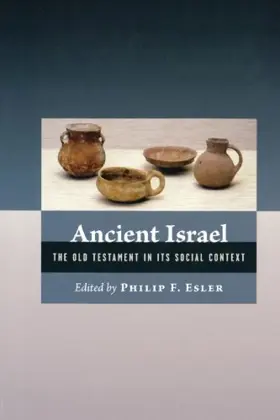

Ancient Israel: The Old Testament In Its Social Context
Pages
440
Publisher
Augsburg Fortress Press
Published
11/1/2005
ISBN-13
9780800637675
This volume brings together essays by an international group of biblical scholars on Old Testament topics, employing social-scientific methods: anthropology, macrosociology, social psychology, and so forth.
Contributors: Marvin Chaney Robert Coote Zeba Crook Richard E. DeMaris Adriana Destro John H. Elliott Philip F. Esler Lester Grabbe Anselm Hagedorn Jutta Jokiranta Carolyn Leeb Bruce J.Malina Andrew Mayes Dietmar Neufeld Mauro Pesce John Pilch Gary Stansell
Reviews
Collection of essays that apply socio-scientific approaches to a variety of topics and texts with varying degrees of insights.
[Full Review]
Minneapolis: Fortress, 2005. Pp. xvii + 420. Hardcover. $35.00. ISBN 0800637674. Hallvard Hagelia Ansgar School of Theology and Mission Kristiansand, Norway 4635 This book is presented on the dust jacket as “an up-to-date assessment of the current state of the social-scientific analysis of the Old Testament,” bringing together “path-breaking essays by an international group of biblical scholars on topics in major growth points of the field.” Editor of the book is Professor Philip F. Esler, Chief Executive of the U.K. Arts and Humanities Research Council, on leave from his ordinary position as Professor of Biblical Criticism at University of St. Andrews, Scotland. The book is edited in four main chapters. First are two articles on “Foundations”: P. F. Esler, “Social Scientific Models in Biblical Interpretation” (3–14); and P. F. Esler and A. C. Hagedorn, “Social Scientific Analysis of the Old Testament: A Brief History and Overview” (15–34). These articles are foundational for the other studies. Second are seven articles on different “Themes”: R. B. Coote, “Tribalism—Social Organization in the Biblical Israel” (35–49); C. S. Leeb, “Polygyny—Insights from Rural Haiti” (50–65); A. Destro and M. Pesche, “Sacrifice—The Ritual for the Leper in Leviticus 14” (66–77); Z. A. Crook, “Reciprocity—Covenantal Exchange as a Test Case” (78–91); G. Stansell, “Wealth—How Abraham Became Rich” (92–110); L. L. Grabbe, “Prophecy—Joseph Smith and the Gestalt of the Israelite Prophet” (111–27); and D.
[Full Review]

